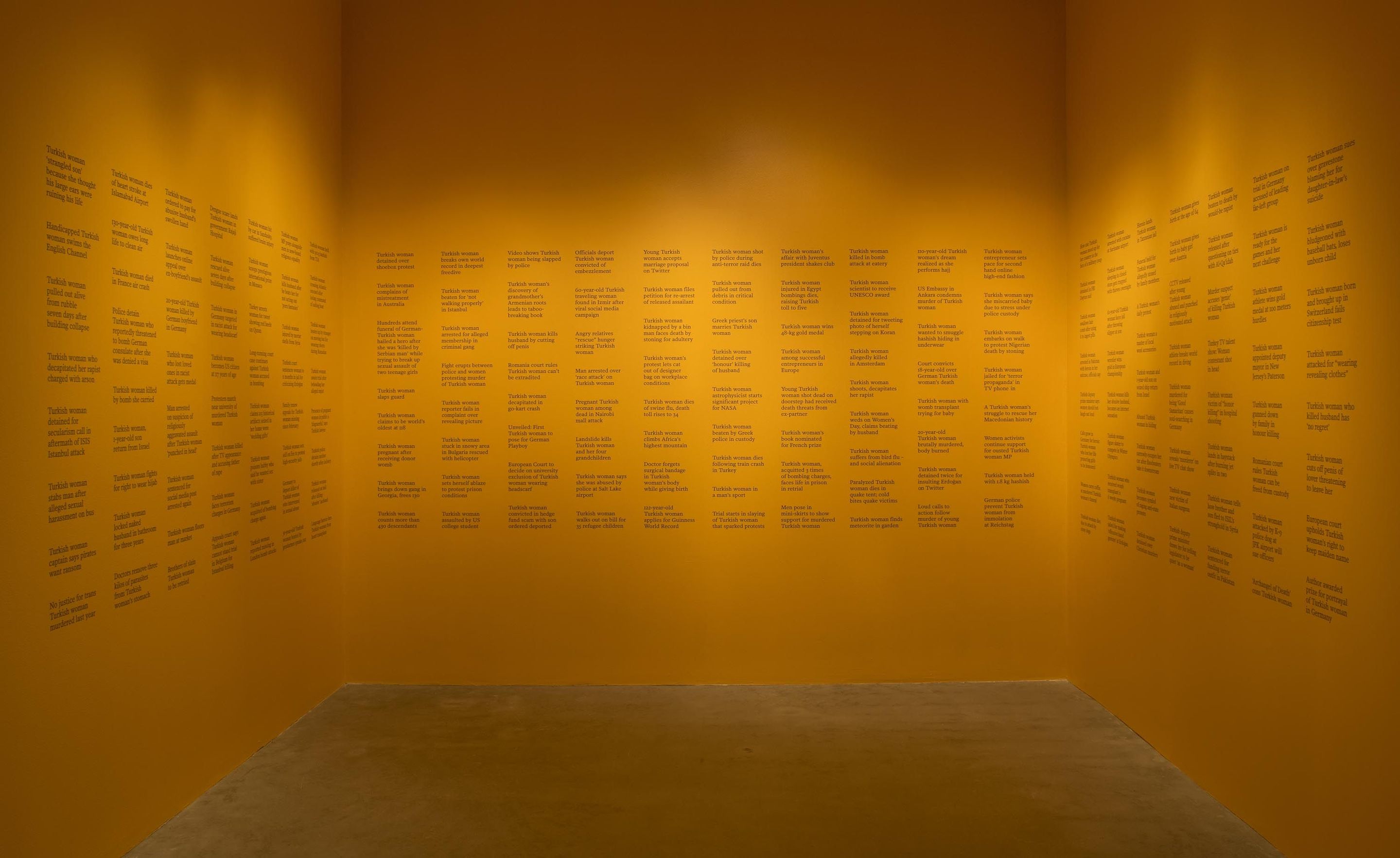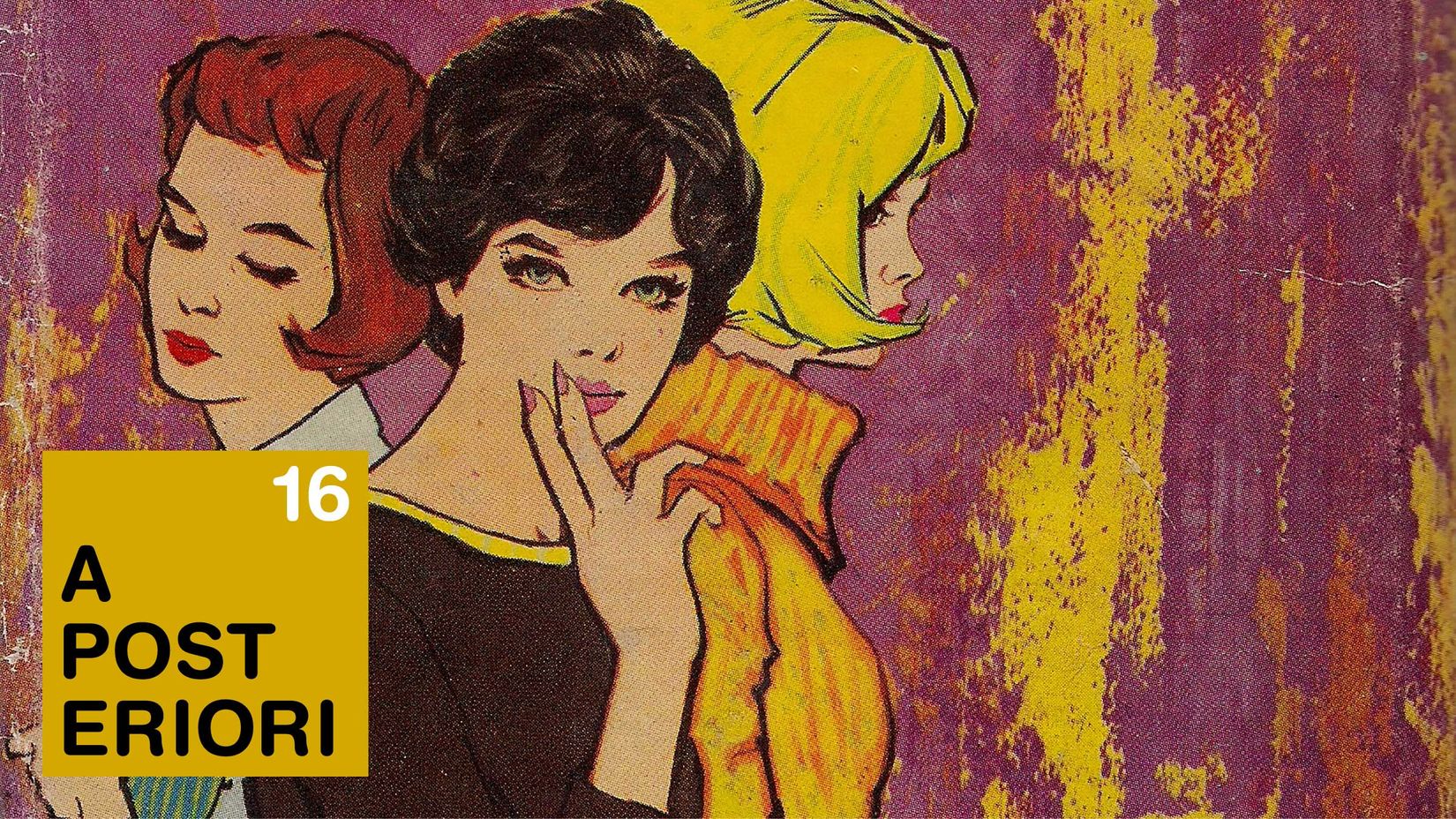
Erdem Taşdelen
The Curtain Sweeps Down
2018.02.14 - 03.31
ÖVÜL Ö. DURMUSOGLU
“Facing east crossing west” is a long-lived story in Turkey’s foundational collective memory. It is an endeavour, a mindset that strives for a bridge but is instead carried along the streams of the gaps between tradition and progress, morals and technology, monarchy and democracy, conservatism and secularism. Translation, therefore, runs on a complex circuit of annotations regarding Turkey’s experience of modernity. The Curtain Sweeps Down is backgrounded by the desires and dilemmas of a changing society: to be able to translate constantly and to be in constant translation. And such desires have been embodied in representations of the female body from early on. To approach Erdem Taşdelen’s fascination with the fictitious translation of the 1950 pulp novel Genç Kızlar (Young Girls) and what it stands for in the post-1950s Turkey that signed the Marshall Plan agreement, it is crucial to draw a brief portrait of this charged site of performance called translation. The way it marks the new and signifies progress has its roots in the late-19th-century efforts to transform the multi-cultured Ottoman Empire and aspirations to catch up with new Western political movements. The first translations from the “West” into Turkish were done in Armenian script; similarly, the first female theatre actors to perform “Western” plays in the country were of Armenian and Greek origin. Tercüme-i Telemak, from 1862, is considered the first “true” Turkish translation (because it used Turkish script). The translator—a well-educated statesman—chose a didactic political novel by Fénelon (Les aventures de Télémaque, 1699) for its democratic aspirations to change.

The still-popular cult pulp Genç Kızlar is indeed one of the important cases in Turkish translation studies, being a fictitious or pseudo-translation. The young writer Nihal Yeğinobalı, who had already started to work as a translator, mimicked certain translation patterns she had previously used to boost the credibility of a novel she had been yearning to write for some time: she created a non-existent author, “Vincent Ewing,” gave him a fictitious life story, and invented a singular novel that had found its way to Turkey, titled The Curtain Sweeps Down. The result was a coming-of-age tale of a love triangle, with liberal erotic details that were considered courageous at the time, which used the background of the American missionary school in Istanbul where she had studied. Yeğinobalı is still considered one of the most prolific translators in Turkey, and has authored five more books in the intervening years. In some interviews she gave after “coming out” as the writer of Genç Kızlar rather than the translator of The Curtain Sweeps Down, she said that, in a country where many writers pass off material from non-Turkish writers as their own, she wanted to explain why a young writer had chosen a foreign attribution for her own writing. The story is more complicated than that, however; a hint is hidden in the title of her later memoir: Cumhuriyet Çocuğu (“Child of the Republic”). The new always used the disguise of translation to arrive in the first place; translation accommodated the new in a society striving to move forward while preserving the traditional. It never ceased to be a political gesture: “children of the Republic” always got caught up in a game of translation—a game stigmatized as “fake Western mimicry” by Turkish conservatives. Yeğinobalı, as one such child of the republic, speaks of and to a post-1950s Turkey completely caught up in the wave of Americanization, branded as open-minded and liberal while strongly rejected in left-wing student circles. A year after her novel was written, Turkey entered NATO as a promising ally in the Cold War against the USSR.
Any textual construction has a mirroring potential for Erdem Taşdelen; he chooses to reveal and mystify the world through text. His particular interest accumulates texts narrating or instructing processes of the modern self, which is usually cultivated in categories. Original texts are taken as departure points—just as in a process of translation—to be expanded upon with visual techniques so as to elucidate the ways in which mirroring operates on individual and collective as well as on social and political levels. Crucially, the mirroring he seeks to expand upon signifies what is untranslatable in this process. Genç Kızlar or The Curtain Sweeps Down presents a many-folded case for the artist, and not only because he is equally sensitive to the two languages involved in the pseudo-translation. As an erotic coming-of-age novel, Genç Kızlar works according to a double projection; first, of an Americanized liberal female self from the small town of Manisa in western Turkey; second, of the hidden sexual repression at work in Turkish society. Yeğinobalı’s strategy is built on performing the self in translation in a country where modernity is experienced as a translation in the face of its adversaries. A new open-minded nationhood is marked by a transformed woman figure, and the attempted dismemberment of that figure suggests the silent collapse of the whole project.
In the first “staging” of The Curtain Sweeps Down, with playful zeal and control, Taşdelen adopts pseudo-translation as an artistic methodology to expand on what Genç Kızlar still reflects after nearly seven decades: the contradictions, desires and trajectories embodied by the self-strategizing of a young woman writer. The fiction of Vincent Ewing dissolves into the well-drawn modern street lines of Manisa. The untraceable stories of secondhand portrait photos are woven together with archival materials from the New York–based Turkish Information Office, which worked diligently to brand a new democracy, with its prima donna, “aviatrice”, nurse, sculptress and secretary. The “new” in “New Turkey” highlights a strong irony, considering how the current political project in the country perpetuates the same name. All this expanding upon this complex circuit of annotations constructs a crucial site for self-understanding from the perspective of collective memory. Has the curtain swept down over the Turkish prima donna who was able to take the stage after her Armenian, Greek and Levantine predecessors? Has the curtain swept down over the free will of liberalism? What did free will mean in the first place? This time, the novel is bound to be a mix of historical drama and suspense.